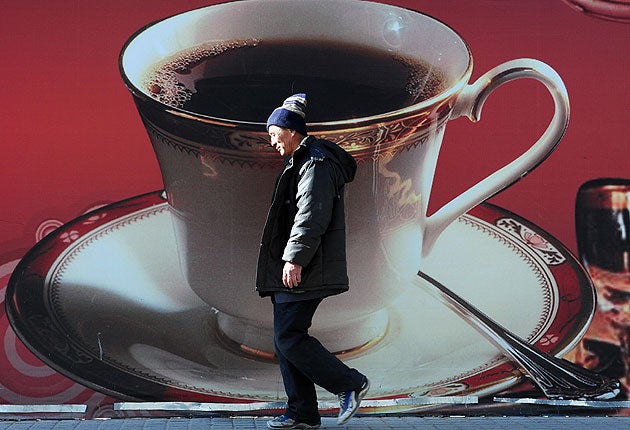Coffee linked to hallucinations

People who consume coffee and other caffeinated products are more likely to have hallucinations, according to a study published today.
The more caffeine students had, the more likely they were to hear voices, smell things and see things that were not there, researchers at Durham University found. They suggested that increased levels of the hormone cortisol caused by caffeine could be behind the link.
Although caffeine found in coffee, tea and chocolate can cause heart palpitations, there is patchy evidence of a relationship to psychotic behaviour such as schizophrenia.
Academics at Durham wanted to check if caffeine made people more prone to hallucinations and feelings of persecution and whether those symptoms were most pronounced in stressed people.
They asked 219 non-smoking students to fill out questionnaires on their caffeine consumption, lifestyle and whether they hallucinated or felt persecuted. The answers ruled out a link with stress or feelings of persecution.
But as caffeine consumption increased, so did hallucinations. For instance, in the top 10 per cent of caffeine users averaging 330mg a day - seven cups of instant coffee or eight cups of tea - nine people had heard things when nobody was there. By contrast, among the 22 people in the bottom 10 per cent, only 3 people reported such hallucinations.
"The present study offers some support for our first hypothesis, namely that when levels of stress are accounted for, caffeine intake is positively related to levels of psychosis-like experiences," said the study.
However, its authors Dr Charles Fernyhough and Simon Jones, pointed out it was not clear if the caffeine had caused the hallucinations. It was possible that people with such psychological disturbances had been drinking coffee to help them cope, they noted in the journal Personality and Individual Differences.
They also acknowledged the non-clinical trial had relied on "retrospective self-report" by the students.
Nonetheless, changes in food and drink consumption, including caffeine intake, might help people cope with hallucinations or reduce their occurrence, the psychologists said, calling for more research.
Mr Jones, a PhD student at Durham’s Psychology Department, said: "This is a first step towards looking at the wider factors associated with hallucinations. Previous research has highlighted a number of important factors, such as childhood trauma, which may lead to clinically relevant hallucinations."
He added: "Hallucinations are not necessarily a sign of mental illness. Most people will have had brief experiences of hearing voices when there is no one there. Around three per cent of people regularly hear such voices."
Caffeine is found in varying levels in a number of drinks, foods and some medicines. A medium cup of tea has 40mg, an instant cup of coffee 45mg, a Starbucks espresso drink 188mg and a Red Bull 80mg.
In November the Food Standards Agency advised pregnant women to consume no more than 200mg caffeine a day from all sources to lower the risk of miscarriage.
The British Coffee Association, the trade body for coffee processors, erroneously asserted that the Durham University study had only involved high caffeine users.
"Whilst the results from this preliminary investigation are interesting, the study has only investigated a very high level of caffeine intake - equivalent to consuming more than six cups of coffee per day," said Dr Euan Paul, the BCA’s executive director.
"Importantly for this population, whilst cigarette smokers were excluded from the study, no details of other substances consumed that may have hallucinogenic effects were included in the data."
He said thousands of published studies had concluded moderate caffeine intake of 400 to 500mg a day was safe for the general population.
Join our commenting forum
Join thought-provoking conversations, follow other Independent readers and see their replies
Comments
Bookmark popover
Removed from bookmarks